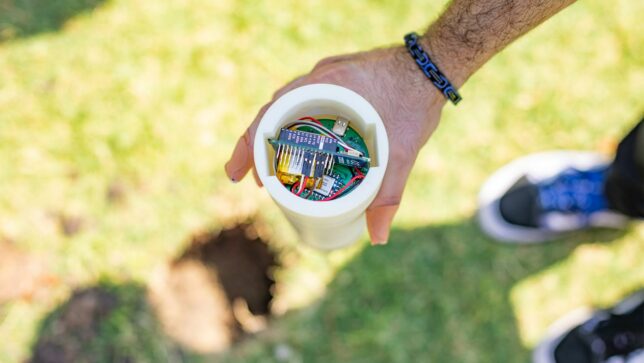University of Texas at Dallas bioengineers have developed sensors that monitor multiple soil parameters, including total soil carbon, to provide farmers with accurate, real-time, continuous data to improve soil health and productivity.

“This is the equivalent of having a wearable health sensor on your body that tells you in real-time what’s happening. Think of it as a wearable for the soil,” said Dr. Shalini Prasad, department head of bioengineering and the Cecil H. and Ida Green Professor in Systems Biology Science in the Erik Jonsson School of Engineering and Computer Science. “We are excited about the potential for our soil sensors to provide more accurate testing of living soil in its ecosystem.”
Prasad, who has developed wearable sensor technology to monitor various human health conditions such as diabetes, received research funding through a two-year UT Dallas Intellectual Property Assignment/Sponsored Research Agreement (IPA/SRA) to investigate the use of electrochemical methods to assess soil health for industry partner Soil in Formation (SIF), a public benefit corporation. In January, SIF sponsored additional research to advance the technology, including technology to capture additional soil parameters.
Electrochemical soil testing involves applying electrical stimulation to the soil and measuring chemical reactions to the voltage. Prasad’s team described the testing of soil using electrochemical sensors in an article published June 29, 2022, in the Journal of The Electrochemical Society.
The method developed by UT Dallas researchers measures pH, moisture, volumetric bulk density and the two main soil carbon pools — levels of soil organic matter and carbonaceous soil minerals — as well as total soil carbon.
Prasad said the sensor represents a paradigm shift in soil testing. Typically, soil is tested by digging up a sample and sending it to a lab, or it is evaluated remotely by infrared methods or satellite. SIF wanted to develop a more direct and accurate method for testing soil as a dynamic, living ecosystem.
Henry Rowlands, the company’s research and development lead, said this new soil health monitoring technology developed by UTD researchers significantly improves the accuracy and auditability of soil test results.
“The sensors developed at UTD should provide data that farmers and other stakeholders can use to improve soil health and mitigate climate change by improving soil’s ability to draw down carbon from the atmosphere,” Rowlands said.
As soil quality declines from damaging agricultural practices, the technology could play a role in enabling the improvement of soil health on a global scale, which also could help address food insecurity, Rowlands concluded.


















